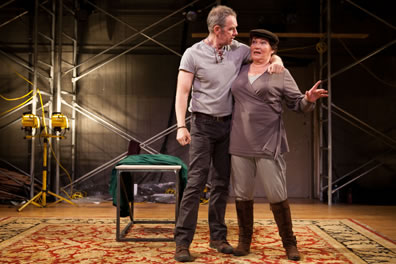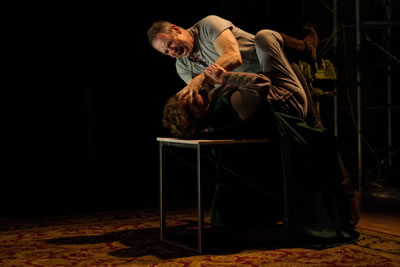Women of Will
Exploring Shakespeare's Feminine Side
By Tina Packer
The Gym at Judson, New York, N.Y.
Saturday, February 16, 2013, (third-row center bleacher in box theater)
Directed by Eric Tucker
Even the Amazons knew they needed men to perpetuate their race. Tina Packer's Women of Will, a show in which the actor-director presents her thesis tracing William Shakespeare's career through his portrayal of women, gets a significant boost from, I dare say it, the show's better half, Nigel Gore. "I come bearing testosterone," he says upon his entrance. He also comes bearing singular acting talent and some of the more interesting insights propounded in the show.

Nigel Gore as Orlando and Tina Packer as Rosalyn playing Gannymede in Women of Will at The Gym at Judson. The scenes from As You Like It were juxtaposed against scenes from Othello, with Gore as the Moore and Packer as Desdemona (below). Photos by Matthew Murphy, Women of Will.
Women of Will, currently taking up residence at The Gym at Judson, an old recreation hall in the basement of a church off New York's Washington Square, is as much a lecture as a play: dissertation theater, if you will. Veteran actress and director Packer, the founding artistic director of Shakespeare and Company in Lenox, Mass., expounds on her thesis, occasionally inviting Gore to interject, and then they play out illustrative scenes. The lecture portions seem off-the-cuff rather than scripted, perhaps by design (at one point, Packer admonishes herself for going off-script). The scenes, meanwhile, are entirely theatrical, enhanced by Les Dickert's lighting design and the pinpoint sound design of Daniel Kluger.
Packer divides Women of Will into five phases:
- In "Warrior Woman, from Violence to Negotiation" she takes us from Joan of Arc and Margaret in Henry VI to Elizabeth in Richard III.
- "The Sexual Merges with the Spiritual; New Knowledge" reveals Shakespeare moving from projecting onto women to writing from within women, as if he were a woman himself, and she illustrates this with Romeo and Juliet.
- With "Living Underground or Dying to Tell the Truth," women become the voice of truth, but they either die for telling the truth or they disguise themselves as men. She juxtaposes scenes of As You Like It with Othello in this section.
- Women desire the same power as men in society in "Chaos Is Come Again, the Lion Eats the Wolf," with Macbeth as the exemplary play.
- "The Maiden Phoenix; The Daughter Redeems the Father" sees Shakespeare turn to women as the engines of social and cosmic healing. Pericles is this topic's featured play, and the production concludes with "The last woman Shakespeare portrayed," says Packer, the infant Elizabeth in Cranmer's prophecy from Henry VIII.
This production is "The Overview" version, covering all five phases in one 2 1/2-hour show. Packer also stages "The Complete Journey"—and will do so during Women of Will's New York run—that devotes two-hour shows to each phase; patrons can see them individually or as a set over the course of five performances. The space has the feel of a project in progress, with scaffolding against the wall, light stands in the playing areas that the actors have to step around, and various props laying about. At the end of the show, Packer invites the audience to compose grafitti of favorite Shakespeare verses on the grandstands and even provides the markers.
 In presenting her thesis, Packer speaks more as a director and actress than a scholar, so her presentation draws dramatic lines that scholars might consider wobbly under more rigorous consideration. Her lumping Othello, written around 1604 in the period of the great tragedies, with the women-as-men comedies of 1601 and before might seem puzzling in itself, and juxtaposing scenes from Othello with scenes from As You Like It, though an interesting dramatic exercise to watch, doesn't clarify the connection. Packer's point, drawn from a career of producing most of Shakespeare's plays, is the unmistakeable trend in the middle of his career that his heroines tend to be killed off, whether physically or allegorically via disguise.
In presenting her thesis, Packer speaks more as a director and actress than a scholar, so her presentation draws dramatic lines that scholars might consider wobbly under more rigorous consideration. Her lumping Othello, written around 1604 in the period of the great tragedies, with the women-as-men comedies of 1601 and before might seem puzzling in itself, and juxtaposing scenes from Othello with scenes from As You Like It, though an interesting dramatic exercise to watch, doesn't clarify the connection. Packer's point, drawn from a career of producing most of Shakespeare's plays, is the unmistakeable trend in the middle of his career that his heroines tend to be killed off, whether physically or allegorically via disguise.
I'm surprised, however, that in this overview performance, she doesn't mention Twelfth Night. That seems to me an obvious transition play as it pairs a woman of phase three, Viola, with a woman of phase four, Olivia, who is powerful enough to run a household, stand up to a duke, and choose whom she wants to marry.
Packer's conclusions also draw on her own interpretation of characters and their contexts. She opens her show with Katherina's speech at the end of The Taming of the Shrew, arguing that, by that point of the play, Kate is either manically frightened, oblivious and lovey-dovey (a la Marilyn Monroe), or clinically depressed. She performs the whole speech transitioning from one persona to the next as Gore plays along as Petruchio: first using his belt as a leash that he despotically tugs on, then wrapping his arms around her in a contented embrace, and, for the third part, standing dispassionately aloof. It's a tour de force performance from Packer, but to contend that Kate would inevitably end up as one of these three archetypes is too pat. I've seen more than a dozen Shrews and almost a dozen different ways of playing that speech, from clinically depressed to ironic to coyly conspiratorial in concert with Petruchio's jest on the assembly (meanwhile, until Packer's performance, I've never seen it done manic or lovey-dovey, but Parker shows those readings to be viable and her Marilyn Monroe imitation comic).
Gore is little more than a prop in this opening sequence, but he soon emerges as an actor of deep talent when he plays the Duke of York being tortured with Rutland's bloody napkin by Packer's Margaret from Henry VI, Part Three. The interplaying of the Othello and As You Like It scenes especially puts on theatrical display Gore's range as he transitions from a troubled Othello trying to grasp the last threads of his pride to a boyish Orlando awkwardly navigating his first-ever experience with romantic love, a wonderful reading of an otherwise wimpy character. Colorado Shakespeare Festival patrons this summer will get to see Gore as Bottom and as Macbeth; subscribe now—his tomorrow speech from Macbeth is hypnotic.
Beyond his acting talent, Gore offers insights of his own into Shakespeare when Packer invites him to interject. After the pair play out Queen Margaret's torturing the Duke of York, Packer points out that Margaret's political maneuvering and language is not much different from Henry V, who threatens Harfleur with defiling its daughters, beheading its fathers, and spitting its infants on pikes. Yet, whereas Henry is considered heroic, Margaret is seen as a bitch (specifically, a "she-wolf"). Gore then puts in how he admires Shakespeare's accomplishment in portraying Margaret but loathes the character herself as she reminds him of another Margaret: Thatcher. "I only have to hear her voice and I can feel my manhood start to shrink," he says of the former British prime minister.
For the fourth section on chaos, Gore points out that Shakespeare seemed to be disillusioned with his career or, at the least, having a midlife crisis. Theater references within his plays during this period are particularly sour: Coriolanus attacks all forms of public performance, Macbeth has his "poor player that struts and frets his hour upon the stage and then is heard no more," and with his portrayal of the poet and painter in Timon of Athens, Shakespeare seems to see "all arts as venal," Gore says.
As theater, Women of Will is a fun lecture featuring keen insights and the experiential opinions of a woman who has lived Shakespeare as a profession for many years. As a lecture, Women of Will is a fun show with keen acting and skillful theatricality. It is a hybrid of form and of personality, too, the combination of Packer's will and Gore's skill. These are two Shakespeare theater pros who know how to entertain as they enlighten, and how to enlighten as they entertain.
Eric Minton
February 20, 2013
Comment: e-mail editorial@shakespeareances.com
Start a discussion in the Bardroom



 Find additional Shakespeareances
Find additional Shakespeareances